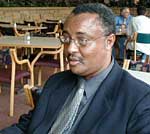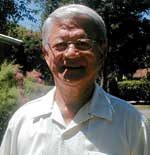By Erin Galbally
Minnesota Public Radio
November 20, 2001
|
| RealAudio |
Rochester's minority population has grown 170 percent over the last decade. The city is now home to several ethnic food stores, and the state's second-largest Somali community. Despite that growth, Rochester's elected public officials are all white. Last year Mohamoud Hamud, a Somali native, attempted to change that trend by running for the Rochester School Board. Even though his campaign was backed by the city's biggest names, Hamud suffered a major defeat at the polls.
| |
|
|
|
||
The who's-who of Rochester came out in force last year to support Mohamoud Hamud's bid for school board. But things didn't work out as they had planned.
"We wound up getting embarrassed a bit actually," says Mike Podulke, a county commissioner who co-chaired Hamud's campaign.
Hamud lost the 2000 election by a 2-1 margin. That outcome was surprising for a number of reasons. First, Hamud is a fiscal conservative in a strongly Republican town. He opposed a school referendum that ended up failing. And he was technically the incumbent. He'd been appointed to the board months earlier, after the first African-American member resigned.
All of that, combined with a list of supporters that included a former Supreme Court justice, the head of the state chamber of commerce and Rochester's most prominent political, business and religious leaders.
"It was a curious combination of things" that led to the defeat, says Podulke. "There is definitely in mind at least a racial - more religious than racial actually - a bit of a backlash for a Muslim on the school board."
Podulke says Hamud might do better as a candidate for city council or county board. He says when people vote for the school board they think of their children. That might make voters hesitant to bring in someone so different. But Hamud hopes to run again for school board. He says it's important to appeal to a cross-section of Rochester voters. That's why he says he didn't campaign on a minority platform.
| |
|
|
|
||
"The last time I ran for election, I got 15,000 votes. A fraction of them were Muslims probably - a handful. So my base support was more than Islam. It was based on my positions on certain issues, and my views on the educational system in Rochester," Hamud says.
According to recent census results, Rochester has gone global. Minorities, many of them refugees, now make up at least 15 percent of the city's population. Students in Rochester's public schools speak more than 50 languages.
All of these numbers represent a big change from the time Chuck Hazama presided as Rochester's mayor. Hazama, a Hawaiian native, gave the city its first brush with minority representation when he was elected in the late 1970s. He says the key to getting elected as a minority is to downplay its significance.
"You have to get the total community behind you and what you're trying to do, and not make race or ethnicity an issue in any campaign," Hazama says.
That's how Hamud structured his campaign. In public, he minimized racial and ethnic differences. When the topic came up, he invariably used diversity as a positive and practical example of an increasingly global society. But supporter Mike Podulke says at the end of the day, many voters only saw the differences - whether in Hamud's African accent or the color of his skin.
"I think it's a bit of an advantage to be a minority, but I don't think the community is ready for a school board member named Mohamoud," he says.
Podulke says the events of September 11 now make a victory for Hamud even more unlikely. But Mohamoud Hamud says he wants his name on next year's school board ballot. He thinks people will vote for him.
More from MPR


